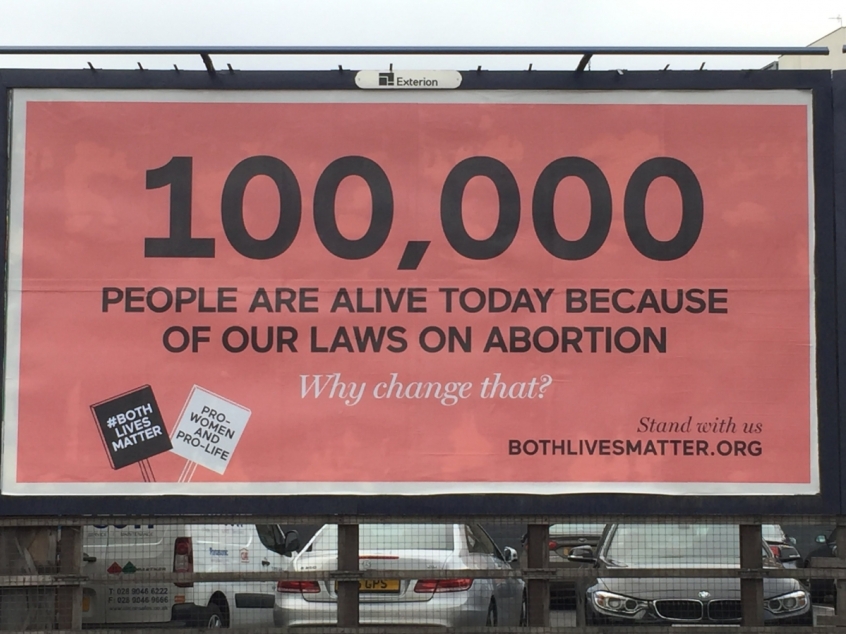
Pro-life and evangelical groups were celebrating today after complaints about a billboard campaign claiming that Northern Ireland's restrictive abortion laws had saved 100,000 lives were dismissed by the advertising regulator.
The Advertising Standards Authority (ASA) said that there was a 'reasonable probability' that the claim was largely accurate and said the assertion was not misleading.
The billboard said: '100,000 people are alive today because of our laws on abortion. Why change that?'
The pro-life group Both Lives Matter (BLM) faced a challenge after 14 complaints said the claim could not be substantiated.
But an ASA statement said: 'On balance, we concluded that the evidence indicated that there was a reasonable probability that around 100,000 people were alive in Northern Ireland today who would have otherwise been aborted had it been legal to do so.
'Because we considered that readers would understand the figure to represent an estimate, we concluded that the claim was unlikely to materially mislead readers.'
Northern Ireland is the only part of the UK where terminations remained banned after the 1967 Abortion Act.
The ASA decision has led to calls for the law in the rest of the UK to be reviewed.
BLM said it had attempted to estimate the number of people alive today because the law had not been introduced in Northern Ireland.
It said it was not possible to calculate an exact figure, but that 100,000 represented a credible and conservative estimate.
The calculation was based on a comparison with Scotland's abortion rate.
Dawn McAvoy from Both Lives Matter said she was delighted with the result. 'Our opponents said we could not substantiate the claim, despite us producing a robust report,' she said. 'The ASA have examined our calculations and backed our figure.'
McAvoy added: 'Their expert concluded that it is reasonable to say that 100,000 people are alive today who would have otherwise been aborted had it been legal to do so.
'This independent verification is a real endorsement of our campaign."
Meanwhile Nola Leach, the chief executive of Christian Action Research Education (CARE) said the decision should give cause for a 'massive rethink' when it comes to policy in Britain.
'Today's ruling presents those of us who live in Great Britain with a very awkward question,' said Leach.
'If 100,000 people are alive in Northern Ireland today who would not be if the 1967 Act had applied in the province, what would the figures look like across England, Scotland and Wales?
'In a few months it is the fiftieth anniversary of the passing of the Abortion Act in 1967: today's news from Northern Ireland requires us all to stop and think on the effect this Act has had on our society.'
There was criticism from pro-choice campaigners, however. Clare Bailey of the South Belfast Green Party said that the 100,000 figure failed to represent the full picture in Northern Ireland.
'I am surprised by the decision,' she said.
'It looks like BLM have a report to back up their claim which I haven't seen, but it would be interesting to know if they've taken into account the amount of women here forced to use online abortion pill providers, and if that would affect the figure.
'They talk about the 100,000 lives this has changed. But my response to this is that one in three women will face a decision to have an abortion in their life, so the law here doesn't stop abortions, it just makes them unsafe and forces people to travel.'
And Emma Campbell, the co-chair of the Alliance for Choice group in Northern Ireland, said: 'Although we are disappointed with the decision of the ASA, we are far more concerned with the disingenuous use of the title "Both lives matter" for the campaign, when we know that lives of women only matter to them if they live by their strict anti-abortion-in-all-circumstances principles. I'm glad they are delighted with their stigmatising of women, as it's clear to see where their priorities lie.'













